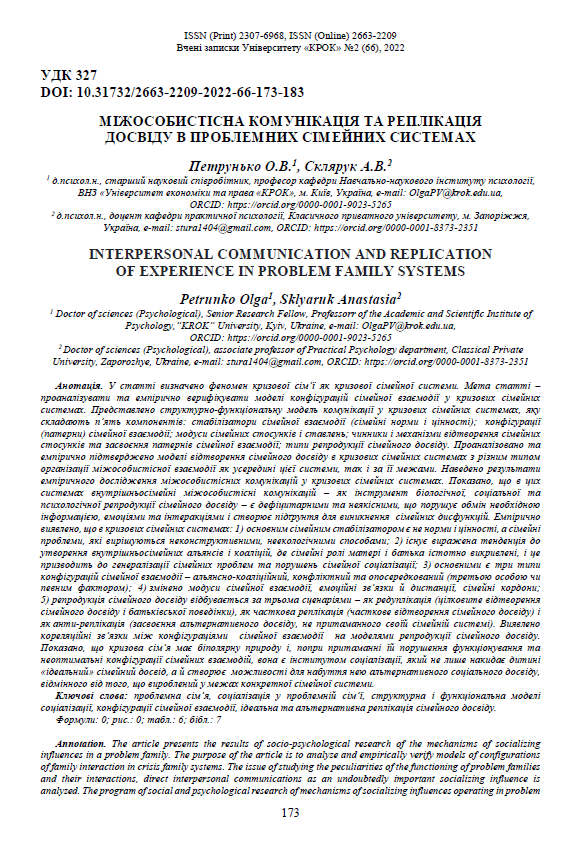INTERPERSONAL СОММUNICATION AND REPLICATION OF EXPERIENCE IN PROBLEM FAMILY SYSTEMS
DOI:
https://doi.org/10.31732/2663-2209-2022-66-173-183Keywords:
problem family, socialization in a problem family, structural and functional model of socialization, configuration of family interaction, ideal and alternative replication of family experienceAbstract
The article presents the results of socio-psychological research of the mechanisms of socializing influences in a problem family. The purpose of the article is to analyze and empirically verify models of configurations of family interaction in crisis family systems. The issue of studying the peculiarities of the functioning of problem families and their interactions, direct interpersonal communications as an undoubtedly important socializing influence is analyzed. The program of social and psychological research of mechanisms of socializing influences operating in problem families which consists of three stages is presented: studying of features of a configuration of a family system of a problem family; study of semantic aspects of socialization of a child in a problem family; implementation of hierarchical cluster analysis, where the selected clusters will reflect the semantic aspects of the child's socialization in the problem family. The structural-functional model of socialization of a child in a problem family is presented, which consists of five components: social systems of a higher level of organization; semantic aspects of the functioning of the problematic family system; structural aspects of problematic family systems; modes of problem family; the basic mechanism of socialization of a child in a troubled family. Empirically understood in the course of the study, these components are described in some way in the article. It has been determined that in a problem family there is a violation of the system of intra-family communications, a worsened psychological atmosphere, distorted family functions and socializing influences. It is established that the problem family is a bipolar phenomenon, which on the one hand, has dysfunction, is characterized by conflict, difficulties in implementing educational functions, etc., and on the other - gives the child more opportunities to gain social experience, promote independence and adaptability. The analysis of the results of the study concludes that the key mechanism of socialization is the assimilation of patterns and configurations of interaction that can be implemented in three types of reproduction of family experience: replication (full reproduction of the parental pattern of behavior), partial reproduction; implementation of opposite (those that are present in the family experience) patterns of behavior. It is proved that the choice of the type of reproduction of experience is determined by the level of criticality, which means a set of cognitive and emotional processes that allow the child based on the unity of analysis (cognitive component) and emotional reflection (emotional component) to make judgments about the appropriateness or inexpediency of family experience. It is shown that the crisis family has a bipolar nature and, despite its inherent dysfunction and suboptimal configurations of family interactions, it is an institution of socialization, which not only gives the child an "ideal" family experience, but also creates opportunities for alternative social experiences. different from that produced within a particular family system.
Downloads
References
Мід Дж. Г. Дух, самість і суспільство. З точки зору соціального біхевіориста: пер. з англ. Київ: Укр. центр духовн. культури, 2000. 416 с.
Мид М. Культура и мир детства / Избр. произв.: Пер. с англ. М.: Гл. ред. «Наука», 1988. 429 с.
Сєдих К. В. Психологія сім’ї. Київ: Aкадемія, 2017. 192 с.
Склярук А. В. Проблемна сім’я як середовище соціалізації дитини: монографія. Херсон : «Гельветика», 2018. 272 с.
Петрунько О. В. Діти і медіа: соціалізація в агресивному медіасередовищі: монографія. Полтава: Укрпромторсервіс, 2010. 480 с.
Москаленко В. В. Особливості дослідження соціалізації особистості в інтерсуб’єктній парадигмі. Соціальна психологія. 2009. № 5 (37). С. 35-48.
Кон И. С. Ребенок и общество: Историко-этнографическая перспектива. Москва : Наука, 1988. 270 с.

Downloads
Published
How to Cite
Issue
Section
License
Copyright (c) 2022 Petrunkо Оlgа, Sklyaruk Anastasia

This work is licensed under a Creative Commons Attribution 4.0 International License.

